Trudy J. Morgan-Cole's Blog, page 27
March 27, 2022
The School of Mirrors, by Eva Stachniak
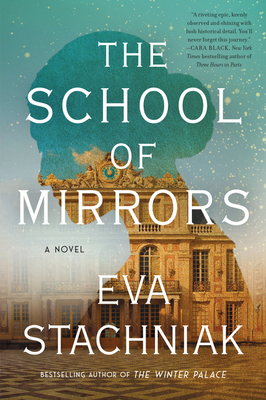
Even though we all know “people thought differently back then,” it’s still a bit of a shock to learn that in 18th century France, King Louis XV, in addition to having a wife and an official mistress, also had a staff member specifically tasked with seeking out beautiful, very young girls (we’re talking early teens here), having them brought to a house near his palace at Versailles, and vetting and training them for the royal bedchamber. Not exactly a harem, especially as it’s doubtful whether more than one or two girls at a time were there and it was in no sense a permanent appointment, but the house called Deer Park is pretty close. The girls there are told that the lover they are brought to the palace to meet is a Polish count, a relative of the Queen; most have no idea they are actually in bed with the King of France.
From the few scant references to this house and its denizens in historical records, Eva Stachniak has woven the story of Veronique, a poor girl snatched from the streets of Paris to be brought to the King’s bed, and the daughter she bears the King, Marie-Louise. The story sweeps from the reign of Louis XV to that of his grandson, Louis XVI, and the Revolution that will cost him his throne and his life. The growing sense of chaos, dread, and fear as the Revolution spins out of control is well-drawn, with the vividly realized midwife Marie-Louise struggling to keep her family safe amidst it all. This is a big, epic story that sweeps us through a turbulent half-century of history with a wonderful eye to detail.
March 19, 2022
Dark Tides, by Philippa Gregory
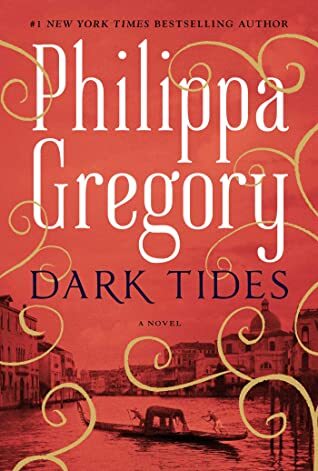
I was pleasantly surprised to discover this book — I loved the prequel, Tidelands, but hadn’t realized the next book in the series came out back in 2020 (and there’s a third coming this fall). I loved this even more than Tidelands; it was a book that immediately drew me in and kept me engrossed with wonderfully rich, detailed scenes set in 1670 London, Venice, and New England.
The action picks up 21 years after Alinor’s affair with James and her trial for witchcraft, which closed the action of Tidelands. Exiled from their home in the tidelands, Alinor and her daughter Alys and their family now live in London, where they manage a small wharf and warehouse on the Thames. They have a small, secure, simple life that they and the young adult children Sarah and Johnnie both enjoy and value. But that simple life is about to be blown apart when not one, but two unexpected visitors arrive at the warehouse on the same day, each with news that will change the lives of Alinor and her family
Meanwhile, on the other side of the Atlantic, Alinor’s doggedly Puritan brother Ned has emigrated to America after the fall of Cromwell. Ned operates a ferry — the same trade he pursued in England befor the civil war — and dreams of a society where every man can live freely without any master or overlord. But as conflicts between his fellow settlers and the Indigenous people of the country, with whom Ned is friendly, heat up, he realizes New England may not be the paradise he has dreamed of.
I loved this whole book and was totally riveted by the conflicts and the family drama, but I was particularly interested in Ned’s sections of the story because I think Philippa Gregory does well what many writers don’t, and what I am trying to do in the Cupids Trilogy — write about English settlement of the Americas in a way that is sensitive to and honours the Indigenous cultures that were displaced and all but destroyed by that settlement. Her portrayal of the Indigenous characters, and the ways in which the well-meaning Ned appears hopelessly slow in his attempts to understand their world, are thoughtful and well-done.
The Last Daughter of York, by Nicola Cornick
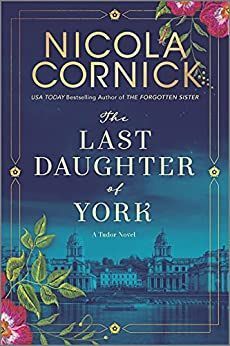
The Last Daughter of York tells two parallel stories, one set in the era of the Wars of the Roses and one set in the present day, with a lightly paranormal element linking the two stories. One story is that of Anne, wife of Francis Lovell, who disappeared after a final attempt to restore the English crown to the House of York. The other is the story of a young English woman named Serena, dealing with a mysterious disappearance of her own — that of her sister eleven years earlier. It becomes apparent pretty early on that time-travel links these two stories, but the precise mechanism and how the stories link together is revealed gradually enough that there are some genuinely surprising twists at the end of story. While I didn’t find this novel had as strong a sense of eerie atmosphere as, say, a Barbara Erskine novel (a writer to whom Cornick is often compared) I found it a quick and interesting read.
March 3, 2022
The Invisible Library, by Genevieve Cogman
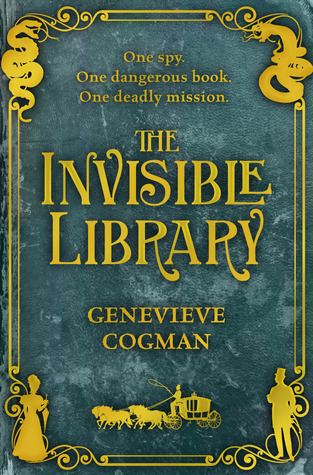
I think I’ve mentioned on here before that my husband and I are both avid readers but we often don’t like the same books. We’re always recommending books to each other but they don’t always work out. Jason has been completely immersed in this “Invisible Library” series of which this is the first book, and he urged me to check it out. I’m not sure I’ve become as avid a fan as he is, but I did enjoy it and will likely read on.
The premise of this fantasy series is that The Library is … well, a vast and powerful library equipped with portals that allow librarians to travel between different alternate worlds/realities, picking up (and sometimes, well, stealing) rare books from different worlds and bringing them back to the Library. Why exactly they need to do this, other than sheer bibliophilia, is not fully explained in this first book, but our main character, librarian Irene, is beginning to suspect there ay be more going on here than just stashing lots of copies of books from all over the multiverse. With her new trainee librarian Kai, who may be more than he appears, she travels to a sort-of steampunk version of London, where she tracks down a version of Grimm’s Fairy Tales belonging to a recently-murdered nobleman. There are, of course, enemies both local and interdimensional to dodge, and a lot of loose threads left dangling that I’m sure will be picked up in later books. This was a good introduction to what seems like a fun series.
The Blue Moth Motel, by Olivia Robinson
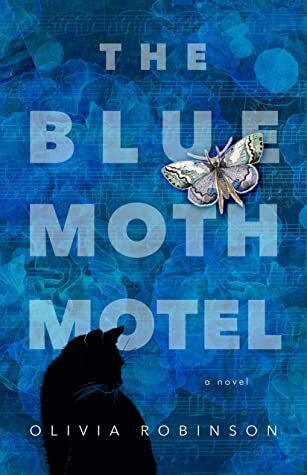
Olivia Robinson’s debut novel The Blue Moth Motel, already longlisted for a major local literary award, is a lyrical coming-of-age story. The main character is Ingrid, who grows up with her sister Norah, their mother Laurel, and their mother’s partner Elena, in the titular motel owned by her grandmother Ada. The time frame shifts between Ingrid’s childhood, narrated in third-person, and Ingrid’s first-person story as a young woman living in London, England, trying to make a living and build a career as a singer.
The motel setting of Ingrid and Norah’s childhood is lovingly evoked: a small, again, slightly run-down hotel perched outside the epicentre of Prince Edward Island’s busy tourism industry (even though it’s a different part of Canada, I kept picturing the motel from Schitt’s Creek). Also beautifully sketched are the close and loving bonds between this unconventional family, and the way music becomes a thread that weaves through both girls’ lives. Though Ingrid has struck out on her own to start a new life for herself, she is drawn to home as the perhaps-mythical blue moths are drawn to firelight.
Olivia Robinson is a brilliant young writer who has a beautiful way with language, and I look forward to seeing what she does next.
Victories Greater Than Death, by Charlie Jane Anders
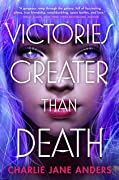
After hearing author Charlie Jane Anders talk about this book on a podcast awhile back I thought it sounded interesting, bought it and then forgot about it for awhile as I was reading other things. When I finally picked it up I enjoyed this fast-paced YA science fiction novel, which is the first in a series.
Teenager Tina Mains kind of falls into the “Chosen One” trope, but the news that she’s special doesn’t come as a surprise to her — she was raised as an average American kid with a loving single mom, but a kid who’s always known that she isn’t actually human, but is a human appearing clone of a powerful alien warrior whose people are someday coming back to pick her up. When the moment finally comes, Tina’s supposed to say goodbye to earth and everything on it forever — but her best friend ends up coming along with her. Far from home and swept into the middle of a war between alien forces, Tina and Rachel have to forge new alliances and figure out how to survive and thrive.
This novel has a lively cast of characters both human and alien, and was a quick, enjoyable read. I am pretty sure I will pick up the next book in the series when it’s out.
February 13, 2022
We, Jane, by Aimee Mann

We, Jane is probably not a novel I would ever have picked up or heard about if it hadn’t been one of this year’s NL Reads selections, which I think is in itself enough to justify a “competition” like NL Reads — the point is not really the competition (which is just a contest for which book/writer can round up the most votes), but to promote books by local authors that readers might not otherwise hear of.
The premise of We, Jane is inspired by the idea of the Jane Collective, transposed to a contemporary Canadian setting. Marthe is a Newfoundland woman living in Montreal, just turned thirty and feeling somewhat rootless and adrift in her life. She feels the need of a cause and a community to belong to, and having had an abortion a couple of years earlier, wonders if abortion rights and access might be a cause for her to get involved in. When she meets an older woman — we later learn her name is Ruth, though for a long time Marthe thinks of her as Jane — who dreams of going back to her rural Newfoundland roots and helping the local midwife perform abortions for desperate women who can’t access legal abortions in St. John’s, Marthe becomes caught up in “Jane’s” dream.
This novel is about a lot of things – reproductive rights, and the challenge of access to abortions in economically depressed and remote rural places even though abortion is legal in Canada, but also about community, about communities of women in particular, and about finding your place in the world. Based on reviews I’ve read online, one of the biggest deciding factors in whether you connect with this book or not will be how you feel about Marthe. She’s very much the central character and it’s about her journey, and although the narration is third-person not first-person, it’s a very close third-person so we do feel like we are getting not just her thoughts but her voice. I loved Marthe’s voice — even when I found the choices she made frustrating (as I often did), I loved her wit and observations (which are, of course, a blend of the character’s and the narrator’s observations – there were at least three sentences in this novel that were such perfect observations of Newfoundland life that I had to highlight them).
I read this book in a single insomnia-riddled night (it’s fairly short), and I think that was a good way to do it — not that I recommend insomnia, but it’s a book that rewards a single, immersive reading. I really enjoyed it. I’m not sure it’ll be enough to change my NL Reads vote (which I thought I had already decided on prior to reading this) but it certainly makes me think twice.
The Sister’s Tale, by Beth Powning
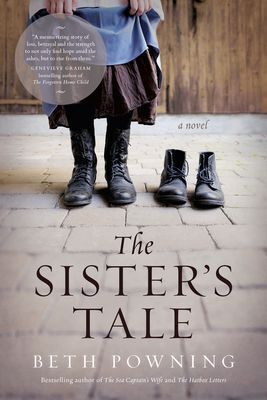
This is a beautiful historical novel set in New Brunswick in the 1880s/1890s. It starts off slow, rich with detail and quiet character development, but builds to a pace where in the last quarter of the book I found it hard to put down.
There’s a large cast of characters here, but there are really two main ones: Josephine, a middle-aged woman with three nearly-grown children; and Flora, an orphaned English “home girl” sent to Canada, who ends up being sold at auction as a pauper. When Josephine “buys” Flora and brings her into her household staff, their two stories begin to intertwine.
Josephine has it all as the book opens: she is happily married to a man she dearly loves; she is proud of her three children; she has a well-run household with a staff of four servants; she has status and respect in society. Flora has nothing; separated from her only remaining family, a younger sister, she is penniless and reduced to being sold at auction; by the time she arrives in Josephine’s household Flora is almost completely powerless. But events conspire to change both women’s situations, as well as forging an unlikely friendship between them.
I loved this book as a reader and I also loved it as a writer, since Beth Powning’s work often covers similar territory to the same type of thing I’m exploring in my novels. The background of the 1880s/90s wave of the women’s suffrage fight in New Brunswick is important in this book — two characters are active suffragists, while others get drawn into the struggle as the need for it becomes apparent — and of course there are many echoes to the suffrage fight here in Newfoundland in the same era, which I had researched and written about in both A Sudden Sun and The Mirror. So those parallels were really interesting to see. Another, more abstract, thing that interested me as a writer, is how Powning manages to build tension and a sense of dread against a quiet, domestic background. Tiny detail by tiny detail, without anything dramatic happening until the climax, she builds a sense of danger around a character so gradually that the readers is nearly as taken aback as the other characters are. This is something I’m currently struggling to do well in the novel I’m working on — adding tension without huge, dramatic action scenes, building to the slow realization danger — so it’s instructive to see a writer as skilled as Powning do it so well.
This is a beautifully detailed, richly developed historical novel with characters that will linger with me for a long time. I highly recommend it.
Where the Light Fell, by Philip Yancey
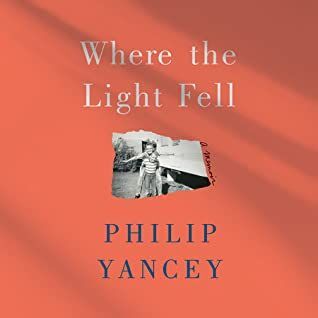
Looking back over this blog reminds me that there was a time in my life when I read a lot of Philip Yancey’s books — in fact, he was one of my most influential writers along my spiritual journey at one point in my life — but that most of that reading was before 2006 when I started this blog. The only Yancey book I’ve read since then was Finding God in Unexpected Places, which was a fine book, but didn’t have the impact of earlier books of his like What’s So Amazing About Grace? and Soul Survivor, which were so essential to me in defining my own path as a Christian.
When I heard Yancey had written a memoir that takes a deep dive into his own troubled family life and very fundamentalist Southern upbringing — stories he has touched on but not explored fully in earlier books — I knew I had to read it (or listen to it, actually, read by the author). Where the Light Fell is a thoughtful, sensitive, beautifully-written and sometimes heartrending story about Yancey’s childhood and youth, and, especially, about his relationships with both his mother and his brother. As is often the case with memoirs, there were questions left unanswered that I would have liked to know the answers to, but I always remind myself you can’t blame someone for writing the book they wanted to write and not including everything I wanted to read about.
Up until the last quarter of the book, you might be forgiven for assuming that this is the memoir of someone who left their Christian faith behind entirely — deconstructed, as we might say now — rather than that of someone who has become known and beloved as one of the most celebrate evangelical Christian authors of the late 20th century. It’s clear Yancey was deeply scarred by the dynamics of his own family and by the racist, ultra-fundamentalist churches in which he grew up, yet somehow in late adolescence he discovered a God of grace and went to write about God’s grace for the rest of his career. His brother chose a different path, and much of the last part of the book is devoted to exploring the relationship between Philip Yancey, Marshall Yancey, and the mother who dedicated both boys to God’s service when they were only toddlers.
As is often the case with novels and memoirs about people’s religious backgrounds, there were things in Yancey’s story that were very unfamiliar, almost alien to me, about him growing up as a Southern fundamentalist in the 1950s and going to Bible college in the 1960s — while other things were oddly familiar from my own experience growing up Seventh-day Adventist in the 1970s. One thing that gave me a lot of think about here is that some of the things Mildred Yancey did to her children — dedicating them to God’s service and telling them they would grow up to be missionaries, and praying that God would do “whatever it takes” to bring them back to Him when they strayed — are so common and acceptable among Christian parents, yet the Yancey family’s story shows how these practices can actually be a form of religious abuse.
February 12, 2022
Redhead by the Side of the Road, by Anne Tyler
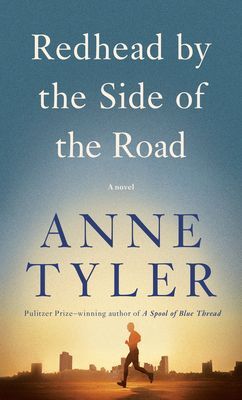
A man who doesn’t quite fit in, who feels somewhat passive and distanced from his own life, who hasn’t had much luck maintaining meaningful relationships — that’s a familiar Anne Tyler character. It could be Liam Pennywell, protagonist of Noah’s Compass and one of my least favourite Tyler characters, but it could just as easily be Barnaby Gaitlyn in A Patchwork Planet, my all-time favourite of her novels.
In this case, though, it’s Micah Mortimer, a solitary single man in his forties who is self-employed as a tech troubleshooter (his one-man company is called Tech Hermit) and a building superintendent. Micah has a small, contained, tidy life, and tidiness — both literal and emotional — is important to him. He also has a girlfriend, not the first he’s ever had, but none of his relationships has ever been long-term or serious, and the relationship with warm, funny schoolteacher Cass seems to be going nowhere. Then someone from his past throws a curve ball into Micah’s well-organized life, and things start falling apart.
It’s a simple premise, well executed, and while I didn’t love Micah as I will always and forever love Barnaby Gaitlyn, he didn’t irritate me like Liam Pennywell did either. He’s just … just a guy, you know, who needs to throw himself a little more wholeheartedly into his won life, and who still has time to make changes. This is a small, neat, enjoyable novel with Tyler’s usual perceptive eye for human detail. I read it quickly and enjoyed it.



